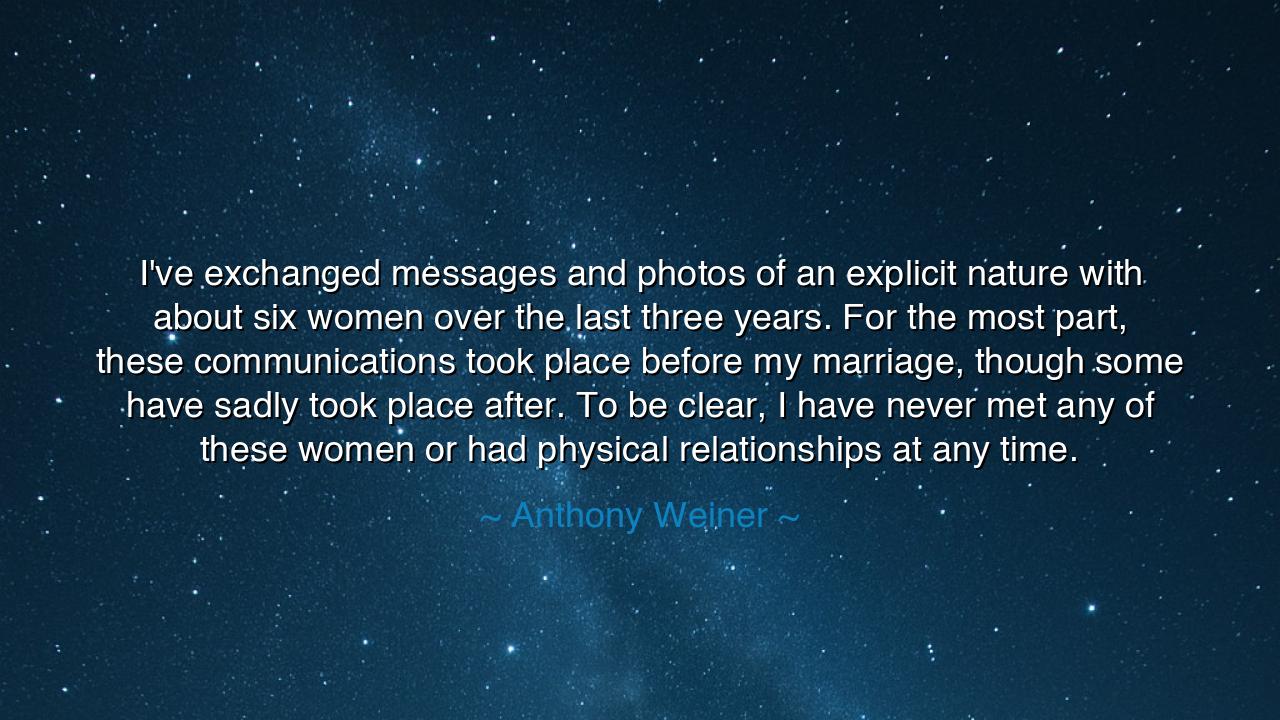
I've exchanged messages and photos of an explicit nature with
I've exchanged messages and photos of an explicit nature with about six women over the last three years. For the most part, these communications took place before my marriage, though some have sadly took place after. To be clear, I have never met any of these women or had physical relationships at any time.






"I've exchanged messages and photos of an explicit nature with about six women over the last three years. For the most part, these communications took place before my marriage, though some have sadly took place after. To be clear, I have never met any of these women or had physical relationships at any time." – Anthony Weiner
In these sorrowful and confessional words, Anthony Weiner, a man once entrusted with the voice of the people, speaks not as a leader, but as a fallen soul confronting his own frailty. His admission — "I have exchanged messages and photos of an explicit nature..." — is more than a statement of scandal; it is a testament to the eternal conflict between desire and discipline, between the public mask of virtue and the private shadow of weakness. Here, we hear not triumph, but reckoning — the ancient cry of a man who has glimpsed the cost of his own unguarded impulses.
The origin of this quote lies in the political downfall of Weiner, once a rising star in American politics, whose career and marriage unraveled when his private misdeeds were brought to light. Yet beneath the particulars of his confession lies a universal truth: that in every human being dwells the power to create or to destroy, and that the greatest battles are not fought in the world, but within the heart. His words — spoken with shame, yet edged with rationalization — reveal a man attempting to draw boundaries between thought and action, between sin imagined and sin enacted. But the ancients would remind him: the corruption of the spirit begins long before the corruption of the flesh.
The ancients understood that temptation is not a stranger to any soul, but a constant visitor. They warned that power and passion, when untamed, lead even the noblest astray. In the temples of Greece, it was said that the downfall of heroes began not with their enemies, but with the blindness of pride. Hubris, they called it — the arrogance of believing oneself immune to the laws that govern all men. So too does Weiner’s confession carry the mark of hubris: a belief that what is hidden will remain hidden, that indulgence without consequence is possible. Yet truth, like the dawn, cannot be forever concealed.
Consider the tale of King David, the shepherd who became a king — a man beloved by God, yet undone by his own desire. When he looked upon Bathsheba and allowed lust to rule his heart, he set in motion a chain of deceit and tragedy. Though his transgression was born in secrecy, its consequences reached far beyond himself. So it is with every act of betrayal — whether of a nation’s trust or a spouse’s heart. The ancient lesson remains: no act is private that wounds the soul, for the soul is never solitary; it is bound to all it touches.
Weiner’s confession, though marked by regret, also reveals the modern delusion — that digital transgression is somehow lesser than physical. He says, “I have never met any of these women or had physical relationships at any time.” Yet the heart knows no such distinctions. Betrayal, whether of the body or the spirit, springs from the same soil — a turning away from integrity, a quiet fracturing of truth. The ancients would remind him that fidelity is not measured by distance, but by discipline; not by the absence of touch, but by the presence of restraint.
And yet, within this tragedy lies a call to reflection for all. For who among us is free from the pull of vanity, the hunger for affirmation, the fleeting comfort of attention? We live in an age where temptation no longer whispers from shadows, but shouts from glowing screens. The lesson, then, is not to scorn the fallen, but to learn from their fall. To remember that character is what one does when unseen, that the soul’s health depends not on appearances, but on the private harmony between thought, word, and deed.
So, my children of the modern age, take heed of this ancient truth: guard your heart, for it is the wellspring of your life. Let no secret indulgence erode your integrity. What begins as curiosity can end as captivity; what seems harmless can wound what is sacred. If you stumble, as all mortals do, confess not with excuses but with humility, and let repentance be the forge of your renewal.
For in the end, Anthony Weiner’s lament is not only his own — it is the timeless song of human frailty. Power, pride, and passion have undone kings and commoners alike. But from each fall, wisdom may rise. To recognize the error is the beginning of redemption; to live in truth, even after disgrace, is to reclaim one’s soul. And so let this story stand not merely as scandal, but as scripture — a reminder that to master oneself is the highest form of leadership, and to live with integrity is the truest form of love.






AAdministratorAdministrator
Welcome, honored guests. Please leave a comment, we will respond soon